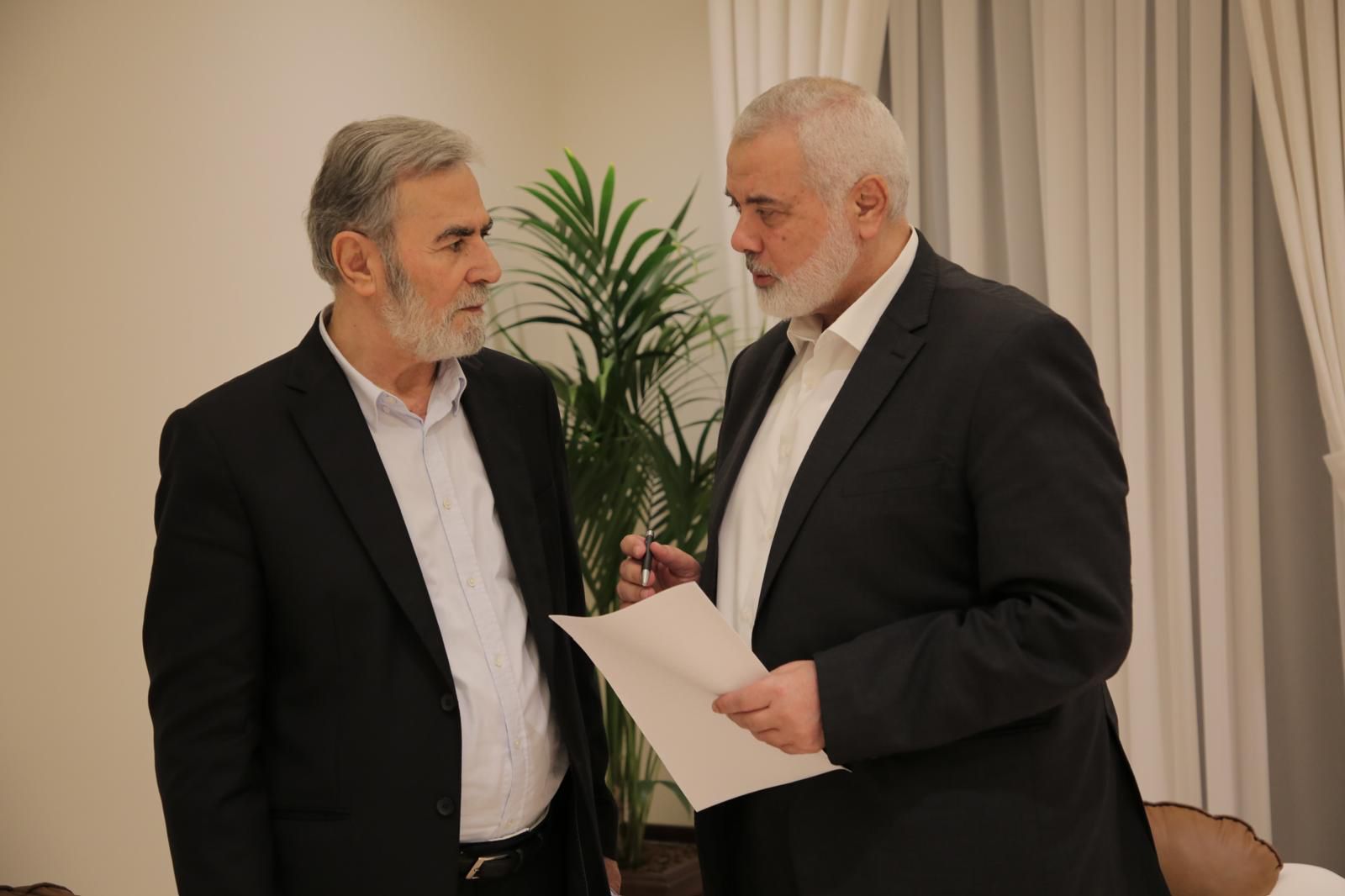Ismail Haniyeh was widely seen as the face of Hamas diplomacy and was at the forefront of negotiations aimed at reaching a ceasefire in the Gaza Strip, where Israel has killed at least 39,550 people.
Israel’s assassination of Hamas political chief, Ismail Haniyeh, in Tehran on July 31 raised questions over the fate of stalled talks aimed at reaching a ceasefire in the Gaza Strip and a captives release deal.
Despite Israel’s escalatory move last week, an analyst believes Hamas would still carry on with the negotiations to reach a deal that serves Palestinians in the Gaza Strip, where the war neared its 10-month mark.
Dr Azzam Tamimi, Palestinian author and analyst told Doha News: “If I were a decision maker within Hamas I would not let the assassination affect my position vis-à-vis the quest for a deal that would end the war and alleviate the suffering of the people of Gaza.
“So, despite the Israeli betrayal, the endeavour to reach a ceasefire deal should continue,” he added in his quotes to Doha News on Sunday.
Haniyeh was assassinated alongside his guard, Wasim Abu Shaaban, in Iran where they were attending the inauguration of Iranian President Masoud Pezeshkian on Tuesday.
Iran’s Islamic Revolutionary Guard Corps (IRGC) confirmed on Saturday that Haniyeh was killed by a “short-range projectile” launched from outside his residence in Tehran.
The assassination came at a critical time amid indirect negotiations between Hamas and Israel, mediated by Qatar and Egypt.
In a statement following the assassination, Qatar’s Prime Minister and Minister of Foreign Affairs Sheikh Mohammed bin Abdulrahman Al Thani questioned the Israeli move.
“Political assassinations and continued targeting of civilians in Gaza while talks continue leads us to ask, how can mediation succeed when one party assassinates the negotiator on the other side? Peace needs serious partners and a global stance against the disregard for human life,” he said on X on Wednesday.
Dr. Tamimi believes the Qatari side “would justifiably be furious” over the move.
“The Qataris have been acting as mediators or brokers and Haniyeh was the principal personality from the Hamas side in the negotiations. So, the Qataris would, justifiably, be furious. Yet, I believe they have already known that Netanyahu was not serious at all about reaching a deal with Hamas,” he explained.
To date, Israel has not confirmed nor denied responsibility for the killing of Haniyeh while its main ally and backer, the United States, maintained that it was “not aware of or involved” in the killing.
The IRGC stressed that the assassination of the top Hamas official “was designed and implemented by the Zionist regime and supported by the criminal government of America” while vowing to “avenge the blood of Haniyeh”.
Analysts pointed to the timing of the attack, which came shortly after Netanyahu’s return from Washington where he addressed Congress on July 24. Netanyahu had met Biden and former president and Republican candidate Donald Trump in a bid to gain more support for Israel.
Dr Tamimi noted that one must keep in mind that “the Zionist project in the Middle East is today a U.S. project”.
“One should never fall to the illusion that the U.S. can be relied on to assist in any way. In fact as we stand today, the Zionist project in the Middle East is today a U.S. project,” the Palestinian analyst said.
“Not only that, I have information to confirm that the U.S. knew of Haniyeh’s assassination and might have provided logistical support,” he added.
An Israeli delegation had travelled to Cairo on Saturday for talks between high-level officials from Egypt and Israel amid reports of new tough demands presented by Israeli Prime Minister Benjamin Netanyahu.
Two Israeli officials privy to the matter told Axios on Saturday that the talks led to no breakthrough.
U.S. President Joe Biden’s top Middle East adviser Brett McGurk was also in Cairo on Thursday, a day after the assassination of Haniyeh, where he met the Director of the Egyptian General Intelligence Directorate (EGID) Abbas Kamel.
Regional tensions
The killing of Haniyeh has fueled regional tensions that have been already on the rise following Israel’s attack on Beirut.
Israel had carried out the attack hours before assassinating Haniyeh, killing at least five civilians and top Hezbollah commander Fuad Shukr. It came months after killing Hamas official Saleh Al-Arouri in a drone strike in Beirut in January 2024, which it did not claim.
Hezbollah has vowed a major retaliation for last week’s attack, which took place amid cross-border attacks between the group and Israel, triggered by the war in Gaza.
Hezbollah’s leader Hassan Nasrallah said on Thursday that a response to Israel is “inevitable” whereas Iran’s supreme leader Ayatollah Ali Khamenei promised to severely punish Israel.
While Iran Hezbollah are preparing to respond to the Israeli attacks, analysts believe regional and international actors are working to prevent further escalation.
“That is likely if a response takes place, and of course it depends on the kind of response. I am sure many regional and international actors are working hard in order to prevent further escalation. It is also a question of whether Iran can afford to respond in a manner that would set the entire region on fire.” Dr Tamimi said.







